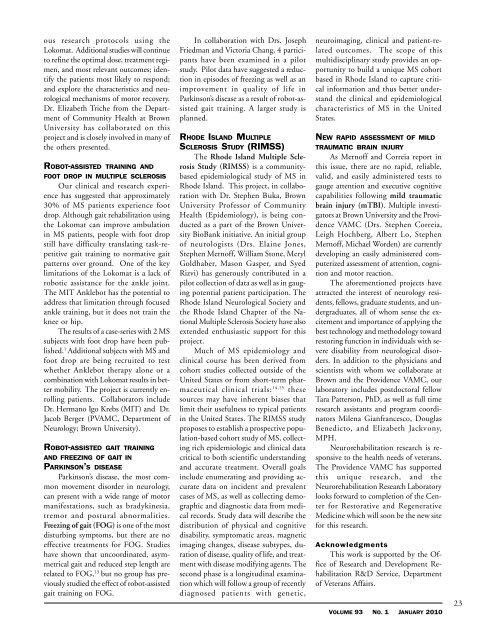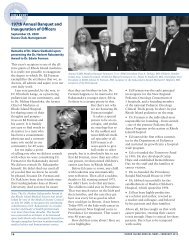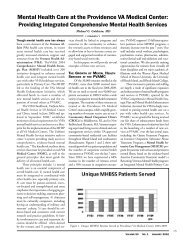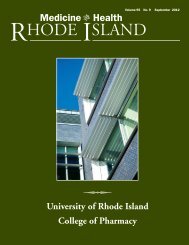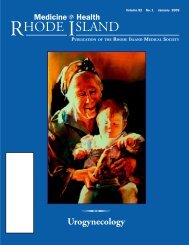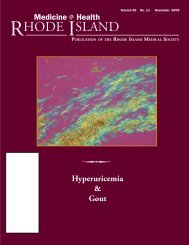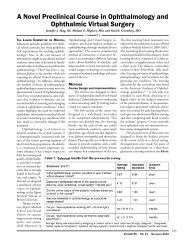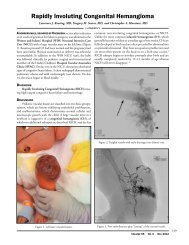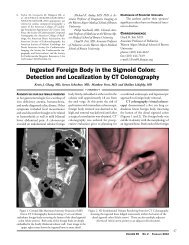The Providence VA Medical Center - Rhode Island Medical Society
The Providence VA Medical Center - Rhode Island Medical Society
The Providence VA Medical Center - Rhode Island Medical Society
- No tags were found...
Create successful ePaper yourself
Turn your PDF publications into a flip-book with our unique Google optimized e-Paper software.
ous research protocols using theLokomat. Additional studies will continueto refine the optimal dose, treatment regimen,and most relevant outcomes; identifythe patients most likely to respond;and explore the characteristics and neurologicalmechanisms of motor recovery.Dr. Elizabeth Triche from the Departmentof Community Health at BrownUniversity has collaborated on thisproject and is closely involved in many ofthe others presented.ROBOT-ASSISTED TRAINING ANDFOOT DROP IN MULTIPLE SCLEROSISOur clinical and research experiencehas suggested that approximately30% of MS patients experience footdrop. Although gait rehabilitation usingthe Lokomat can improve ambulationin MS patients, people with foot dropstill have difficulty translating task-repetitivegait training to normative gaitpatterns over ground. One of the keylimitations of the Lokomat is a lack ofrobotic assistance for the ankle joint.<strong>The</strong> MIT Anklebot has the potential toaddress that limitation through focusedankle training, but it does not train theknee or hip.<strong>The</strong> results of a case-series with 2 MSsubjects with foot drop have been published.1 Additional subjects with MS andfoot drop are being recruited to testwhether Anklebot therapy alone or acombination with Lokomat results in bettermobility. <strong>The</strong> project is currently enrollingpatients. Collaborators includeDr. Hermano Igo Krebs (MIT) and Dr.Jacob Berger (P<strong>VA</strong>MC, Department ofNeurology; Brown University).ROBOT-ASSISTED GAIT TRAININGAND FREEZING OF GAIT INPARKINSON’S DISEASEParkinson’s disease, the most commonmovement disorder in neurology,can present with a wide range of motormanifestations, such as bradykinesia,tremor and postural abnormalities.Freezing of gait (FOG) is one of the mostdisturbing symptoms, but there are noeffective treatments for FOG. Studieshave shown that uncoordinated, asymmetricalgait and reduced step length arerelated to FOG, 13 but no group has previouslystudied the effect of robot-assistedgait training on FOG.In collaboration with Drs. JosephFriedman and Victoria Chang, 4 participantshave been examined in a pilotstudy. Pilot data have suggested a reductionin episodes of freezing as well as animprovement in quality of life inParkinson’s disease as a result of robot-assistedgait training. A larger study isplanned.RHODE ISLAND MULTIPLESCLEROSIS STUDY (RIMSS)<strong>The</strong> <strong>Rhode</strong> <strong>Island</strong> Multiple SclerosisStudy (RIMSS) is a communitybasedepidemiological study of MS in<strong>Rhode</strong> <strong>Island</strong>. This project, in collaborationwith Dr. Stephen Buka, BrownUniversity Professor of CommunityHealth (Epidemiology), is being conductedas a part of the Brown UniversityBioBank initiative. An initial groupof neurologists (Drs. Elaine Jones,Stephen Mernoff, William Stone, MerylGoldhaber, Mason Gasper, and SyedRizvi) has generously contributed in apilot collection of data as well as in gaugingpotential patient participation. <strong>The</strong><strong>Rhode</strong> <strong>Island</strong> Neurological <strong>Society</strong> andthe <strong>Rhode</strong> <strong>Island</strong> Chapter of the NationalMultiple Sclerosis <strong>Society</strong> have alsoextended enthusiastic support for thisproject.Much of MS epidemiology andclinical course has been derived fromcohort studies collected outside of theUnited States or from short-term pharmaceuticalclinical trials: 14,15 thesesources may have inherent biases thatlimit their usefulness to typical patientsin the United States. <strong>The</strong> RIMSS studyproposes to establish a prospective population-basedcohort study of MS, collectingrich epidemiologic and clinical datacritical to both scientific understandingand accurate treatment. Overall goalsinclude enumerating and providing accuratedata on incident and prevalentcases of MS, as well as collecting demographicand diagnostic data from medicalrecords. Study data will describe thedistribution of physical and cognitivedisability, symptomatic areas, magneticimaging changes, disease subtypes, durationof disease, quality of life, and treatmentwith disease modifying agents. <strong>The</strong>second phase is a longitudinal examinationwhich will follow a group of recentlydiagnosed patients with genetic,neuroimaging, clinical and patient-relatedoutcomes. <strong>The</strong> scope of thismultidisciplinary study provides an opportunityto build a unique MS cohortbased in <strong>Rhode</strong> <strong>Island</strong> to capture criticalinformation and thus better understandthe clinical and epidemiologicalcharacteristics of MS in the UnitedStates.NEW RAPID ASSESSMENT OF MILDTRAUMATIC BRAIN INJURYAs Mernoff and Correia report inthis issue, there are no rapid, reliable,valid, and easily administered tests togauge attention and executive cognitivecapabilities following mild traumaticbrain injury (mTBI). Multiple investigatorsat Brown University and the <strong>Providence</strong><strong>VA</strong>MC (Drs. Stephen Correia,Leigh Hochberg, Albert Lo, StephenMernoff, Michael Worden) are currentlydeveloping an easily administered computerizedassessment of attention, cognitionand motor reaction.<strong>The</strong> aforementioned projects haveattracted the interest of neurology residents,fellows, graduate students, and undergraduates,all of whom sense the excitementand importance of applying thebest technology and methodology towardrestoring function in individuals with severedisability from neurological disorders.In addition to the physicians andscientists with whom we collaborate atBrown and the <strong>Providence</strong> <strong>VA</strong>MC, ourlaboratory includes postdoctoral fellowTara Patterson, PhD, as well as full timeresearch assistants and program coordinatorsMilena Gianfrancesco, DouglasBenedicto, and Elizabeth Jackvony,MPH.Neurorehabilitation research is responsiveto the health needs of veterans.<strong>The</strong> <strong>Providence</strong> <strong>VA</strong>MC has supportedthis unique research, and theNeurorehabilitation Research Laboratorylooks forward to completion of the <strong>Center</strong>for Restorative and RegenerativeMedicine which will soon be the new sitefor this research.AcknowledgmentsThis work is supported by the Officeof Research and Development RehabilitationR&D Service, Departmentof Veterans Affairs.VOLUME 93 NO. 1 JANUARY 201023


